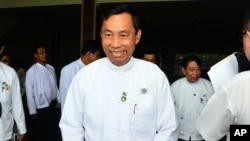Myanmar President Thein Sein carried out a purge of the leadership of the country’s ruling party Thursday in a major political shakeup ahead of national elections in November.
The party released a statement saying that Union Solidarity and Development Party chairman Shwe Mann was removed from that post because his duties as both party leader and parliamentary speaker were too much of a burden.
The longtime politician, who had indicated in the past that he would run for president in 2015, has not commented on his removal.
Changes
Officials said Shwe Mann will remain as parliament speaker and as a party candidate in the upcoming polls.
Moving up to replace Shwe Mann is Vice Chairman Htay Oo. USDP Secretary General Maung Maung was also removed.
The changes came in what some described as an “internal coup,” with security forces surrounding USDP headquarters in the capital Naypyidaw early Thursday, preventing officials from leaving.
“While the USDP has described the incident at its headquarters as an internal party matter, we are concerned about the apparent use of state security forces to help resolve the dispute," U.S. Embassy Burma assistant public affairs officer Jamie William Ravetz told VOA.
"It is important that the government clarify what actions it has taken and their legal basis. Maintaining public trust in the democratic process will be critical throughout this election season and ultimately the transition to a new government next April that reflects the will of the people," Ravetz said.
Considered reform-minded
The ousted officials were considered reform-minded and having “very good relations with Aung San Suu Kyi and the National League for Democracy party,” independent political commentator Yan Myo Thein told VOA.
“That's why that relation would be one of the factors that pushed the removal of the top leaders from the party,” he said.
Additional factors for their ouster likely were differing views on constitutional changes and the peace process which involves negotiations with 16 armed ethnic groups.
General elections are scheduled for November, the first in Myanmar, also known as Burma, since decades of military rule ended in 2011.
“The date of the election will not change. Everything else is going to be the same,” Min Zaw Oo of the Myanmar Peace Center told VOA. “I don't see any significant shakeup in the timeline towards the election.”
Upcoming elections
President Thein Sein announced at this week’s party convention he would not run stand for re-election as a parliamentary candidate, but he could still be nominated again for president.
The USDP is predicting it will prevail in the balloting for which a total of 90 parties have registered candidates.
The leader of the most popular opposition party, the NLD’s Aung San Suu Kyi, is ineligible to become president due to a constitutional clause that excludes her because her two sons hold foreign citizenship.
The party of the Nobel Peace Prize laureate is to contest almost all of the available seats in parliament and is expected to make heavy gains in the legislature.
The Election Commission's deadline for parties to submit candidate lists is Friday.
The NLD won the vast majority of parliamentary seats in the 1990 general election while Aung San Suu Kyi was under house arrest. The military junta refused to recognize the results and continued to rule the country until 2011.
Candidates
Earlier this week, 149 senior officers retired from their army posts to run as USDP candidates in the upcoming elections. But at the party convention Wednesday, only 59 of the former army officers were accepted as candidates.
“The military officers who are sent to the party, they are not playing any significant role in the reshuffling in the party leadership,” the well-connected academic Min Zaw Oo in Yangon told VOA. “I was calling some of the military officers who will be contesting the election and that they don't even know what's going on over there.”
Tensions surfaced in June when the USDP backed a motion that would have ended the military's de facto ability to veto constitutional amendments.
The measure also was backed by the NLD, which had collected 5 million signatures in support of the reform.
The military, which opposed the measure, has a constitutionally guaranteed 25 percent of seats in parliament, enough to block constitutional reforms it opposes.
Ingjin Naing and Htet Aung from Naypyidaw, Myanmar, and Zinlat Aung in Bangkok contributed to this report.




